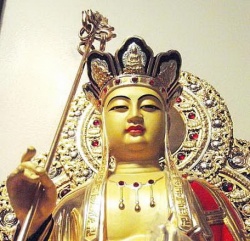Difference between revisions of "Perfect Enlightenment Sutra"
(Created page with "thumb|250px| <poem> Perfect Enlightenment Sutra [円覚経] (Chin Yüan-chyeh-ching; Jpn Engaku-kyo ) An abbreviation of the Complete and Fi...") |
|||
| (4 intermediate revisions by the same user not shown) | |||
| Line 1: | Line 1: | ||
[[File:Kshitigarbha.41.jpg|thumb|250px|]] | [[File:Kshitigarbha.41.jpg|thumb|250px|]] | ||
<poem> | <poem> | ||
| − | |||
| − | |||
| − | An abbreviation of the Complete and Final Teaching on Perfect Enlightenment Sutra. A | + | |
| + | |||
| + | |||
| + | |||
| + | |||
| + | [[Perfect Enlightenment Sutra]] | ||
| + | |||
| + | |||
| + | [[円覚経]] ([[Chin]] [[Yüan-chyeh-ching]]; Jpn [[Engaku-kyo]] ) | ||
| + | |||
| + | An abbreviation of the Complete and Final [[Teaching]] on Perfect [[Enlightenment]] [[Sutra]]. A [[Sutra]] translated into {{Wiki|Chinese}} in 693 by [[Buddhatara]] who had gone to [[China]] from [[Kashmir]]. In this [[Sutra]], [[Shakyamuni]] explains the [[mystic]] {{Wiki|principle}} of {{Wiki|perfect}} [[Enlightenment]] and the practice for its [[attainment]] to an audience of twelve [[Bodhisattvas]] | ||
| + | |||
| + | |||
| + | [[including]] [[Manjushri]], [[Universal Worthy]], and [[Maitreya]]. Contemporary [[scholars]] [[view]] this [[Sutra]] as a work produced in [[China]], where this [[Sutra]] was widely read and a number of commentaries written on it. It had considerable [[influence]] on the [[Flower Garland]] ([[Hua-yen]]) and [[Zen]] ([[Ch'an]]) schools, and was regarded highly by the [[Zen]] school in particular. | ||
| + | |||
| + | |||
</poem> | </poem> | ||
{{R}} | {{R}} | ||
Latest revision as of 13:00, 26 December 2023
Perfect Enlightenment Sutra
円覚経 (Chin Yüan-chyeh-ching; Jpn Engaku-kyo )
An abbreviation of the Complete and Final Teaching on Perfect Enlightenment Sutra. A Sutra translated into Chinese in 693 by Buddhatara who had gone to China from Kashmir. In this Sutra, Shakyamuni explains the mystic principle of perfect Enlightenment and the practice for its attainment to an audience of twelve Bodhisattvas
including Manjushri, Universal Worthy, and Maitreya. Contemporary scholars view this Sutra as a work produced in China, where this Sutra was widely read and a number of commentaries written on it. It had considerable influence on the Flower Garland (Hua-yen) and Zen (Ch'an) schools, and was regarded highly by the Zen school in particular.
